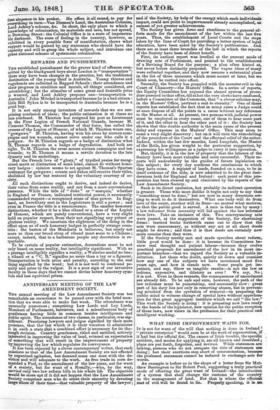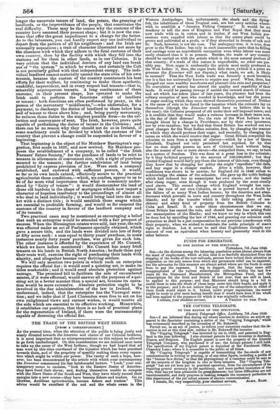WHAT IRISH IMPROVEMENT WAITS FOR.
IT is not for want of the will that nothing is done in Ireland "private enterprise" would soon be at the work of regeneration2 if it had but the official fiat. The causes of Irish trouble, the specific antidote, and modes for applying it, are all known and described ; plans are put forth, forgotten, and revived. While statesmen are talking, persons who do not arrogate the title of statesmen are doing ; but their exertions stop short of consummation, because the professed statesman cannot be induced to exchange acts for words.
An example is before us in the shape of a letter from Sir Mat- thew Barrington to Sir Robert Peel, suggesting a truly practical mode of effecting the great want of Ireland—the introduction of a system that shall change the customs of the country in the management of land. For that is where the efficient. root of evil will be found to lie. Properly speaking, it is ye> longer the uncertain tenure of land, the potato, the grasping of landlords, or the improvidence of the people, that constitutes the real difficulty. These may be the causes why the customs of the country have assumed their present shape; but it is now the cus- toms that offer the great impediment to a change for the better. As to the labourers, you can hardly expect any one individual to depart from the pattern of all his neighbours : and the Irish are unusually sequacious ; a trait of character illustrated not more by the closeness with which they adhere to the fatal customs of their own country, than by the facility with which they fall into the Customs set for them in other lands, as in our Colonies. It is very seldom that the individual denizen of any land can break out of "the system" in which he works, and certainly the Celt is not peculiarly gifted with that independent energy. The indi- vidual landlord cannot materially amend the state even of his own tenants, because the custom of the country counteracts his best efforts for their welfare, by continuing to make them apathetic, unskilful, improvident, and in every respect bad tenants—that is, miserably unprosperous tenants. A long continuance of these customs, in their present shape, has operated to make the Irish unfit to perform the functions either of landlord or tenant : both functions are often performed by proxy, in the person of the mercenary "middleman,"—who undertakes, for a payment, to discharge the duties of landlord to those below him and of tenant to those above him ; and, being purely mercenary, he reduces those duties to the simplest possible form—to the col- lection and conveyance of rent. The Irish, however, prove quite capable of performing the duties of tenant in the Colonies ; and there can be no reason why they should not do so in Ireland, if some machinery could be devised by which the customs of the country that prevent a change could be suspended in favour of a beginning.
That beginning is the object of Sir Matthew Basrington's sug- gestion, first made in 1837, and now revived. Sir Matthew pro- poses the establishment of a company, to be called "the Irish Farmers' Estate Society," for the purchase of lands to be relet to tenants in allotments of convenient size, with a right of purchase secured to the tenants; the further subdivision of land being prohibited by express provision of law. Were such a company established, and endowed with sufficient powers, it would, so far as its own lands extend, effectively secure to the practical agriculturist these conditions,—which, we confess, appear to us to -be of far more vital importance than what is commonly under- stood by "fixity of tenure" : it would disencumber the land of those old burdens in the shape of mortgages which now impart a character of hopeless insolvency to the proceedings of almost all who deal in land individually ; it would bring land into the mar- ket with a distinct title ; it would establish those usages which are essential to profitable farming, and would so far suspend the customs of the country in favour of the landlord company and of its tenants.
Two practical cases may be mentioned as encouraging a belief that such an enterprise would be attended with a fair prospect of success. When the Blessington estates were sold, last year, the sale was effected under an act of Parliament specially obtained, which gave a secure title, and the lands were divided into lots of forty or fifty acres each: a sum equal to thirty years' purchase, in some instances nearly forty years purchase, was given for such lots. The other instance is afforded by the experience of Mr. Cunard, which we have before mentioned : Mr. Cunard has many Irish tenants on his lands in British North America ; he finds them pay their rents well, exercise the right of purchasing their lands with alacrity, and altogether become very thriving settlers. We will only mention two points in which such an enterprise requires the official fiat : it would need a quieting act, to make its titles marketable ; and it would need absolute protection against outrage. The promised bill to facilitate the sale of encumbered estates, if it were effectual, would answer all the purposes of a qui- eting act in a better manner than a special act, because its opera- tion would be more extensive. Absolute protection ought to be involved in the due administration of the law in Ireland. We understand, indeed, that the enterprise has the Viceregal sanc- tion; and we infer that if Lord Clarendon were free to act on his own enlightened views and earnest wishes, it would receive all the aids which are essential to its effective working. Meanwhile, it establishes our position, that there is no lack of practical plans for the regeneration of Ireland, if there were the statesmanship capable of decreeing the official fiat.



























 Previous page
Previous page